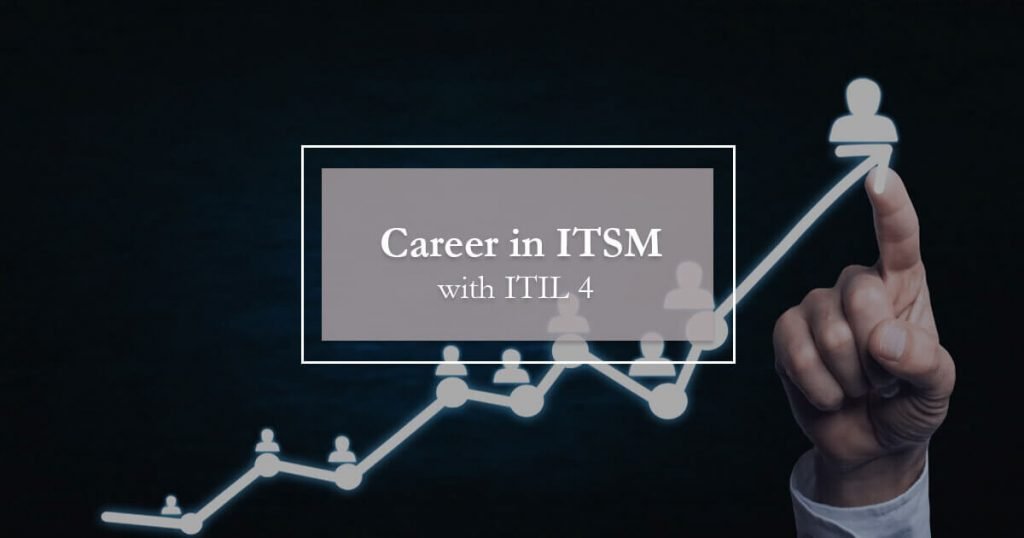Building a Career in IT Service Management with ITIL
 According to the Information Technology Service Management Market – Growth, Trends, and Forecast (2020 – 2025) report by ResearchAndMarkets.com, the IT Service Management (ITSM) market value will grow from 2019’s USD 6.41 billion to USD 12.19 billion come 2025.
According to the Information Technology Service Management Market – Growth, Trends, and Forecast (2020 – 2025) report by ResearchAndMarkets.com, the IT Service Management (ITSM) market value will grow from 2019’s USD 6.41 billion to USD 12.19 billion come 2025.
This growth is fueled by businesses implementing ITSM solutions to regularize processes through structured delivery and documentation. ITSM also brings actionable IT insights that help in decision-making.
So, if you’re considering a career in ITSM, this may be the perfect time to work towards it.
Why Choose a Career in ITSM
Regardless of industry, today’s organizations depend heavily on their IT infrastructure. ITSM professionals are vital components in an organization’s success as they are involved in designing, delivering, managing, and improving the IT services an organization provides to its end users. They are also valuable assets for the management of business processes and decision making.
Because of their high demand, ITSM professionals enjoy a higher pay scale. According to Glassdoor, the average base pay in the United States is $125,319 per year with the lowest being $68,000 per year and the highest being $146,000 per year. These numbers increase as professionals gain more experience and certifications. For instance, an ITIL certified Information Technology Manager can earn $ 111,681.87 per year.
IT Service Management Jobs in 2020
If you’re convinced ITSM (IT Service Management) is the best career path for you, here are some of the top jobs you should aim for.
1. IT Project Support or IT Support
This is an entry-level position where you support teams working on projects and become an essential contributor to project activities. As a result, you’ll become familiar with project tools and environments. You’ll also gain general administration skills to complement your project management skills.
As you develop project management skills during your career, you can always choose to become an analyst in a Project Management Office (PMO) or start taking responsibility of projects as a project manager.
If you decide to pursue this career line, you can be promoted to IT project manager or service level manager if you have the knowledge and experience required for these positions.
2. Service Desk Technician
As a service desk technician, your job is to support software and hardware users. Your responsibilities include, but aren’t limited to –
- Fixing technical faults
- Answering users’ queries
- Fulfilling service requests
- Helping users with their rights, passwords, user accounts
You’re also responsible for identifying and diagnosing issues and problems, advising users on required actions, and prioritizing unresolved issues.
As you gain skills and experience, you can expect to be promoted to Service Desk Manager, Project Coordinator, or Application Support Analyst.
3. Service Desk Manager
Service Desk Managers are essential for organizations that have a significant-sized service desk. Their responsibility is to handle team operations and ensure high morale. Some of the core tasks performed by professionals in this position are:
- Managing daily operations
- Monitoring response time and user satisfaction levels
- Ensuring integrated action plans with the help of consultants
- Coming up with techniques and practices for managing client queries
- Troubleshooting and problem resolution and prioritization
Based on your skills, you’ll be later promoted to service level manager, IT operations manager, or IT change manager. You can also choose to become a project manager by pursuing project management certifications.
4. IT Operations Manager
IT operations managers have a crucial role in their organizations due to their responsibilities, which include:
- Implementing and managing IT services
- Implementing best practices, principles, and methods (e.g. ITIL)
- Building a network of experts
- Developing Service Level Agreement (SLA) templates and negotiating complex SLAs
- Acting as a point of escalation for users of IT infrastructure services
- Promoting a culture focused on service excellence
- Monitoring and analyzing performance, problem trends, and client feedback reports
- Offering continual improvement in service management strategy
By gaining ample experience and knowledge in this position, you can pave your way towards becoming a business relationship manager or CIO.
5. Chief Information Officer
Chief Information Officer is one of the senior-most roles for ITSM professionals. In this position, you’ll be responsible for:
- Defining the company’s IT strategy
- Managing all Information Services (IS) department activities
- Making recommendations to senior general management
- Ensuring reliability, confidentiality, and integrity of all information systems including compliance with service level agreements
- Managing risks
- Negotiating and implementing complex contracts
How ITIL Can Help with Your ITSM Career
Information Technology Infrastructure Library (ITIL) is the go-to framework for organizations that wish to align their ITSM to their needs. Implementing this framework also offers benefits such as improving customer relations, ensuring effective risk management, and creating cost-effective practices.
What is ITIL
ITIL defines a set of rules and best practices for IT service management. It covers every activity, including planning, designing, delivering, operating, and controlling IT products and services. It’s customer-focused and emphasizes measuring and improving processes.
The latest iteration of the framework, ITIL 4, aims to help organizations co-create value from their IT products and services. It also builds on ITIL’s strengths to deliver a better customer experience, value streams, and digital transformation. Moreover, it aligns with new ways of working such as Lean, Agile, and DevOps.
Why Become ITIL Certified
ITIL helps professionals to understand IT infrastructure and service management. This is important as ITSM is an essential part of most organizations. Moreover, companies that provide these services should understand the framework to achieve advantages such as predictable service levels, improved efficiency, consistency in processes, and effective change management.
For ITSM professionals, having an ITIL certification provides the following benefits:
- More Knowledge and Skill – Preparing for the certification gives practitioners more insight into ITIL and how they can use it to work more efficiently to become a productive resource.
- Higher Pay – ITIL certifications can effectively give your pay scale a substantial bump. In fact, you can expect an increment of 15% or more to your salary.
- Holistic View – With the skills you gain, you can become better at understanding the bigger picture and contributing accordingly. This, in turn, improves your chances of employment and promotion.
How to Become an ITIL Certified ITSM Professional
So, are you ready to become an ITIL certified ITSM professional? If that’s a resounding ‘yes’, here’s a quick look at the certification scheme to help you get started.
ITIL 4 Foundation
ITIL 4 Foundation is the initial level of the ITIL certification scheme. It serves as an introduction to the framework while providing practitioners with an end-to-end operating model. With this model, they can create, deliver, and continually improve tech-enabled products.
ITIL 4 Managing Professional
ITIL 4 Managing Professional is one of the streams in which you can pursue more in-depth knowledge on the ITSM framework. This stream offers practical and technical knowledge on running IT-enabled services, teams, and workflows.
There are four modules within this stream:
1. ITIL 4 Specialist Create, Deliver, and Support
This module covers core service management activities and the creation of services. It focuses on integrating value streams and activities to create, deliver, and support IT products and services. Moreover, it helps professionals understand service performance, service quality, and improvement methods.
2. ITIL 4 Specialist Drive Stakeholder Value
Designed for professionals in charge of managing and integrating stakeholders, this module details the types of engagement and interactions between service providers and customers, users, suppliers, and partners. Certification candidates will also learn important concepts such as SLA design, CX and UX design, customer journey mapping, and more.
3. ITIL 4 Specialist High-velocity IT
With this module, IT managers and experts will become more efficient while working in high-velocity environments. The module explores ways in which digital organizations can function successfully to rapidly deliver products and services for maximum value. It also highlights the use of Agile, Lean, Cloud, Automation, and other practices and technologies.
4. ITIL 4 Strategist Direct, Plan, and Improve
This module teaches professionals the necessary skills for creating a learning and improving IT organization. It provides a method for planning and delivering continual improvement through Agile and Lean.
ITIL 4 Strategic Leader
This is the second intermediate stream of ITIL 4. Through this stream, practitioners will learn how valuable ITIL is for both operations as well as digitally enabled services.
In addition to the ITIL 4 Strategist Direct, Plan and Improve module detailed above, the stream includes ITIL 4 Leader Digital and IT Strategy. This module teaches practitioners the need to align digital business strategy with IT strategy. It also helps them build and implement IT and digital strategy for digital disruption.
ITIL 4 Master
This is the top-level certification of the ITIL 4 scheme. AXELOS, the organization behind ITIL, is yet to disclose how practitioners achieve this certification. However, stay tuned to our blog for more details once they start circulating.
The Bottom Line
There is no stopping to the demand for IT service management regardless of industry, size of business, etc. Therefore, this is the right time for you to consider a career in ITSM and becoming responsible for incidents, service requests, problems, changes, and IT assets.
With ITIL 4, rest assured you will become a valuable asset to your employer. In addition to expanding your knowledge and skills, the framework will equip you with various methods, best practices, and tools which will make you a valuable contributor to your organization.
So, start your journey towards the highest ITIL 4 certifications from ITIL 4 Foundation. And best of luck for the future.





Infosec Train
November 24, 2020Thanks for sharing such useful information with us. I hope you will share some more info about ITIL. Please keep sharing!
Fariha Fawad
December 3, 2021Thank you. Will keep on updating you with more valuable content. Stay Tuned.